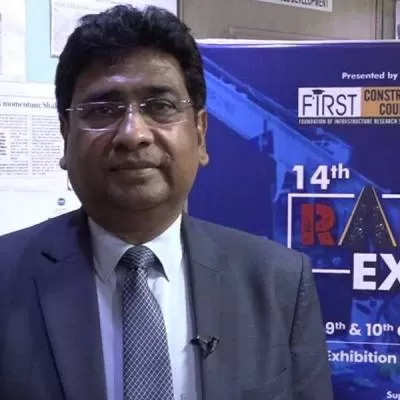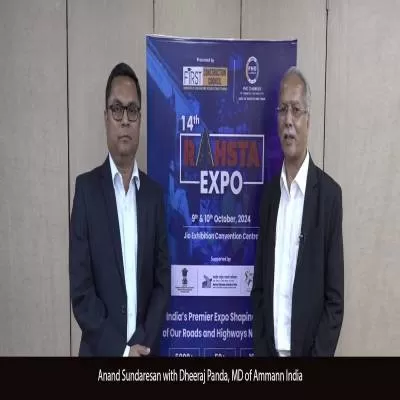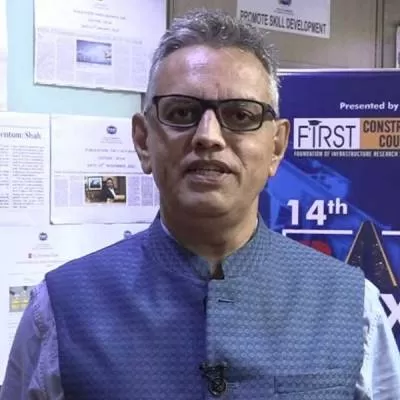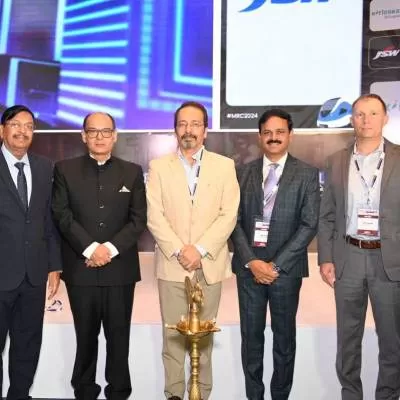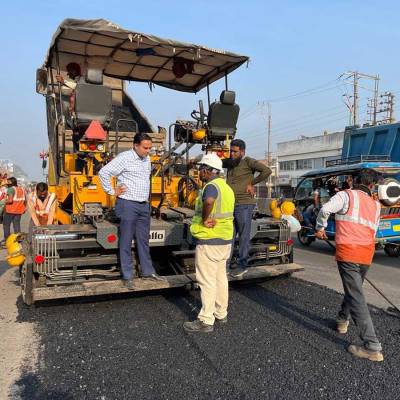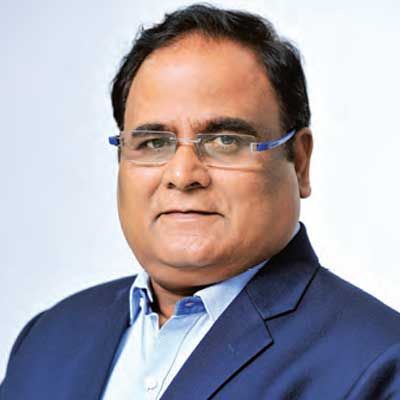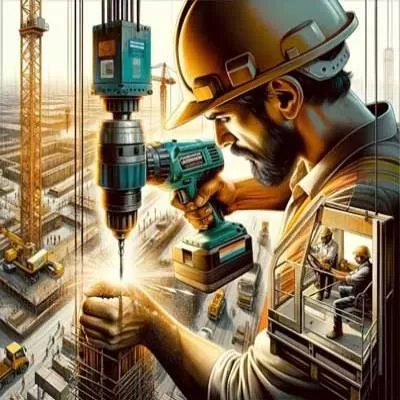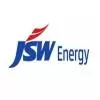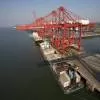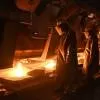- Home
- Infrastructure Urban
- ECONOMY & POLICY
- Crush control
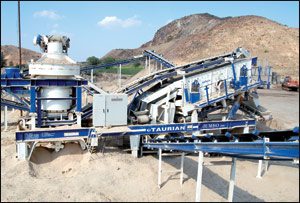
Crush control
Is the crushing and screening industry facing a crushing defeat to adverse market forces? Industry voices speak in unison about the lacklustre state of affairs.
Negative sentiments "The Indian crushing and screening industry is passing through one of the most difficult phases ever seen," says Gautam Datta, General Manager-Marketing, Taurian Engineering Pvt Ltd. "Mining restrictions in various states have slowed growth." According to Sanjay Jadhav, Deputy General Manager-Crushing & Screening Business, Voltas Ltd, M&CE Division, "The crushing and screening market is not encouraging - it's almost flat." As major market depressants, Jadhav cites delays in the auctioning of quarry leases, delays in getting environment and pollution control clearances and protracted finance approvals. "Also, the road and aggregate sector, once perceived as a key driver of the crushing and screening equipment market, is seemingly on hold until the central elections. And the iron ore market continues to be lukewarm, operating at 30-40 per cent capacity," he adds.
"In view of the widespread ban on iron ore mining by private companies and other mining sector challenges, infrastructure and road projects are the major demand drivers for crushing and screening equipment," observes Somnath Bhattacharjee, President -Material Handling Solutions & Equipment and Project Solutions Business, TIL Ltd. One kilometre of road built by the NHAI requires about 40,000-50,000 tonne of aggregates, so the demand potential is high. "However, the dismal performance of road project awarded in FY2012-13 vis-a-vis expectations failed to pick up demand for crushing and screening plants," he adds.
Bright prospects
Amidst the pall of gloom, some providers can see a ray of hope for the industry. Datta is optimistic about the future as some state governments are planning to open up mining to cope with the demand of the construction and infrastructure sector.
According to Raghavan Ramaswamy, President, Sales Area India, Sandvik Construction, "Overall, the crushing and screening equipment market is currently volatile. Urban infrastructure projects that have taken off in recent years have created demand for crushing and screening plants, both from major players and small or medium contractors. The entry of new players in recent years has increased competition, brought lower priced models into the market and encouraged smaller contractors to enter the aggregate industry. But India's infrastructure industry has huge potential for growth and opportunities for investment. So the long-term prospects are bright."
"The only positive is that crushing and screening equipment is faring better than other construction equipment categories," says Bhattacharjee. "Many state governments are banning or putting restrictions on river bed sand quarrying. This is triggering the higher use of rock sand and crushed ultrafine. Also, selective lifting of the ban on iron mining in Odisha, Goa and Karnataka is improving the outlook for crushing and screening plants. So while the immediate outlook is tepid, as the underlying demand is strong, we expect a sharp recovery in the future especially as land acquisition, environment and forest clearance processes ease."
Evidently, changing regulations are creating windows of opportunities that smart providers are promptly tapping. In view of the growing demand for plants processing ultrafines, TIL has launched high frequency screens that apply vibrations directly to the screen and can be adjusted in different angles. These screens are capable of producing Zone II grade of sand, which is clean and sharp and suitable for construction activity or mass concrete. The screens can also produce plastering grade of sand complying with IS standards.
Cost-consciousness
Slow growth and tightening liquidity are putting the focus on costs, and this is having an impact on the customer's choice of equipment. "Customers are looking for cost-effective operations; their biggest concern is cost per tonne for sustainable business and growth," says Jadhav.
Buyers aiming at higher returns on their investments are demanding bigger plants. Some buyers are opting for plants with safety features that offer energy savings and come from superior brands. According to Ramaswamy, "The trend has already up-scaled from 100 tph to 200 tph plants, and demand for 300 tph and above is rising as we speak." In keeping with this development, he sees growing scope not only for Sandvik's complete crushing and screening equipment solutions catering to any size-reduction challenge, stationary or mobile, but for upgrading existing plants.
In tune with customer needs, companies are bringing out new crushing and screening equipment models equipped with cost-saving features.
For instance, Powerscreen's Warrior 1400X comes with a new screen media set-up, which can reduce the need for crushing by 25-30 per cent, as early users overseas have experienced. This drives down operational costs while increasing production ability. Further, set-up and take-down time can be cut by 10 per cent and it is less noisy. "The Warrior 1400X has been designed with the economy in mind, with reduced engine running speed and enhanced hydraulics," says Rajen Khoda, Director-Sales, South Asia & Middle East, Powerscreen. "It offers a reduction in fuel consumption of up to 15 per cent compared to its predecessor."
Improvement in middle-grade quality means that mid-grade product can be sent straight to the stockpile as these are correctly sized. A new chassis riser has been built in so that the stockpiling capacity of fines and mid-size products increases by nearly 50 per cent. Khoda sees this new offering as especially useful for coal mines, iron ore mines and quarry owners working at river beds.
Proman Infrastructure Services Pvt Ltd has been pushing for greater awareness about cost-efficient dry plaster and sand production processes. In collaboration with REMco (USA), Proman has launched the vertical shaft grinder (VSG) machine along with a special screen to produce fine-grade plaster or concrete sand via a dry process.
"The VSG product offers 35 per cent power savings and the unique feature of grinding and producing finer grade plaster or concrete sand as per customised requirements," shares RS Raghavan, Managing Director, Proman Infrastructure Services Pvt Ltd. "It can produce high-quality round or cubical sand, less than 2 mm in size, complying with the IS 383 Zone II/IS 1542 standards with the best fineness modulus."
Total solutions
With the launch of VSG, Proman has catapulted itself into the league of providers of total innovative crushing solutions. In its case, it offers both wet process (Proman-Ortner) and dry process special screens-based plaster and sand production plants.
TIL has launched track-mounted crushing and screening plants that have been well received for their robust design, superior features and productivity. Next, it plans to launch a range of wheeled crushing and screening products to become a total solutions provider offering static, wheeled and track plants and a wide variety of screen solutions. It also plans to make inroads in new geographical areas.
In the current cost-conscious environment, Jadhav believes track mobile crushing and screening plants have an edge over their stationary counterparts. "Time is money," he underlines. "Mobile plants can be shifted faster and operations can be started in a few hours. Also, they can be operated and maintained with less manpower; they do not entail additional costs for civil work and need lower maintenance and operation cost."
Atlas Copco has recently launched a range of rig-mounted bucket crushers for efficient and economic recycling and crushing of all types of inert material on site. "Rig-mounted bucket crushers are an answer to the growing demand for mobile on-site crushing in recycle or crushing of construction and demolition waste, road construction, excavation and quarrying," says Vipin Bhatia, Product Manager-Construction Tools Division (Hydraulic Attachments), Atlas Copco Construction Technique. "Atlas Copco bucket crushers are low maintenance and reduce mechanical equipment on site, as well as transportation and dump site costs."
With this launch, Atlas Copco has become a one-stop solutions provider to modern demolition requirements. Additionally, its demolition attachment portfolio includes KRUPP percussion technology incorporated hydraulic breakers, combicutters, etc.
"Bucket crushers can be employed at all urban worksites, especially in confined conditions," adds Bhatia. "They can enhance cost effectiveness because asphalt, stone and concrete debris as well as mine and quarry material can be crushed and directly reused on site or sold to third parties."
Service orientation
Service is an integral part of total solutions, and plays a big role in boosting the productivity of daily operations. To take customer service to a new level, Sandvik Construction has launched 24 + 7 bespoke services as part of its continued aftermarket development. Customisation entails adapting to local requirements, offering true customer-driven aftermarket support. Sandvik has simultaneously launched the Sandvik Solitaire Club, wherein customers get priority services while getting cost-savings. Customers can choose between two types of services - Premium or Classique - dependent on their specific requirements and the orientation of their business. Interestingly, Sandvik is serving a greater number of customers who only want sound technical advice.
Whether it is demand for products or services, client-focused delivery is the order of the day.
Smart companies lower cost of operations
Weigh in the one-time owning cost of proposed crushing and screening plants and their recurring operating costs to settle on the right make and model. According to Gautam Datta, General Manager-Marketing, Taurian Engineering Pvt Ltd, "For crushing and screening plants, the owning cost to the operating cost ratio is 1:5. The relatively high operating costs are of great concern."
Instead of focusing on the upfront investment itself, Dutta recommends opting for a plant with lower operational costs in all terrain irrespective of the stone and climatic conditions. For instance, Rashi Resources Pvt Ltd purchased its first Taurian 200 TPH two-stage, wheel-mounted crushing and screening plant for operations in Kalyan in 2009.
The plant's performance and favourable cost-benefit ratio swung subsequent deals in favour of Taurian crushing and screening plants. "The Taurian plant is about 20 per cent cheaper to operate than comparable brands," says Atul Hirawat, Director, Rashi Resources Pvt Ltd. Up until 2013, the company procured another seven Taurian plants, which it has deployed in different terrains in Maharashtra, Odisha, Assam, Meghalaya, Madhya Pradesh and Uttar Pradesh.
Somnath Bhattacharjee, President-Material Handling Solutions & Equipment and Project Solutions Business, TIL Ltd, lays stress on the need to get acquainted with all the features of the plant under consideration and the total cost of ownership. "All TIL-Astec equipment is sold after threadbare discussions and validation of the overall value being delivered." "Users must focus on total ownership costs and understand the hidden costs," advises Shankar N Srivastava, Director, Engineer Pro Consultants. "The upfront investment in a typical three-stage, 200-tph plant can vary from Rs 3-5 crore. But the operational costs will differ between units. Whereas manpower and power costs are known variables, equipment maintenance costs and consumable replacements owing to wear and tear are variables that depend on the kind of aggregate being crushed and equipment metallurgy. Metallurgy plays a big role in crushing and screening and only providers are in the know about this."
So, Srivastava recommends providing the vendor with samples of the rock proposed to be crushed and asking for advice based on analysis of its physical properties like hardness, abrasivity, impact value, moisture content, etc. Physical attributes of the rock sample will determine the running cost, which can vary from Rs 20 per tonne to Rs 100 per tonne. "Companies must also consider the quantity of aggregate they plan to sell or use, to determine the best buy based on both the upfront investment and operational cost," he adds.
To share your views on India's Crushing and Screening Equipment market, write in at feedback@ASAPPmedia.com
Giving customers exactly what they need has become the focus of crushing and screening equipment vendors in India, finds CHARU BAHRI. Is the crushing and screening industry facing a crushing defeat to adverse market forces? Industry voices speak in unison about the lacklustre state of affairs. Negative sentiments "The Indian crushing and screening industry is passing through one of the most difficult phases ever seen," says Gautam Datta, General Manager-Marketing, Taurian Engineering Pvt Ltd. "Mining restrictions in various states have slowed growth." According to Sanjay Jadhav, Deputy General Manager-Crushing & Screening Business, Voltas Ltd, M&CE Division, "The crushing and screening market is not encouraging - it's almost flat." As major market depressants, Jadhav cites delays in the auctioning of quarry leases, delays in getting environment and pollution control clearances and protracted finance approvals. "Also, the road and aggregate sector, once perceived as a key driver of the crushing and screening equipment market, is seemingly on hold until the central elections. And the iron ore market continues to be lukewarm, operating at 30-40 per cent capacity," he adds. "In view of the widespread ban on iron ore mining by private companies and other mining sector challenges, infrastructure and road projects are the major demand drivers for crushing and screening equipment," observes Somnath Bhattacharjee, President -Material Handling Solutions & Equipment and Project Solutions Business, TIL Ltd. One kilometre of road built by the NHAI requires about 40,000-50,000 tonne of aggregates, so the demand potential is high. "However, the dismal performance of road project awarded in FY2012-13 vis-a-vis expectations failed to pick up demand for crushing and screening plants," he adds. Bright prospects Amidst the pall of gloom, some providers can see a ray of hope for the industry. Datta is optimistic about the future as some state governments are planning to open up mining to cope with the demand of the construction and infrastructure sector. According to Raghavan Ramaswamy, President, Sales Area India, Sandvik Construction, "Overall, the crushing and screening equipment market is currently volatile. Urban infrastructure projects that have taken off in recent years have created demand for crushing and screening plants, both from major players and small or medium contractors. The entry of new players in recent years has increased competition, brought lower priced models into the market and encouraged smaller contractors to enter the aggregate industry. But India's infrastructure industry has huge potential for growth and opportunities for investment. So the long-term prospects are bright." "The only positive is that crushing and screening equipment is faring better than other construction equipment categories," says Bhattacharjee. "Many state governments are banning or putting restrictions on river bed sand quarrying. This is triggering the higher use of rock sand and crushed ultrafine. Also, selective lifting of the ban on iron mining in Odisha, Goa and Karnataka is improving the outlook for crushing and screening plants. So while the immediate outlook is tepid, as the underlying demand is strong, we expect a sharp recovery in the future especially as land acquisition, environment and forest clearance processes ease." Evidently, changing regulations are creating windows of opportunities that smart providers are promptly tapping. In view of the growing demand for plants processing ultrafines, TIL has launched high frequency screens that apply vibrations directly to the screen and can be adjusted in different angles. These screens are capable of producing Zone II grade of sand, which is clean and sharp and suitable for construction activity or mass concrete. The screens can also produce plastering grade of sand complying with IS standards. Cost-consciousness Slow growth and tightening liquidity are putting the focus on costs, and this is having an impact on the customer's choice of equipment. "Customers are looking for cost-effective operations; their biggest concern is cost per tonne for sustainable business and growth," says Jadhav. Buyers aiming at higher returns on their investments are demanding bigger plants. Some buyers are opting for plants with safety features that offer energy savings and come from superior brands. According to Ramaswamy, "The trend has already up-scaled from 100 tph to 200 tph plants, and demand for 300 tph and above is rising as we speak." In keeping with this development, he sees growing scope not only for Sandvik's complete crushing and screening equipment solutions catering to any size-reduction challenge, stationary or mobile, but for upgrading existing plants. In tune with customer needs, companies are bringing out new crushing and screening equipment models equipped with cost-saving features. For instance, Powerscreen's Warrior 1400X comes with a new screen media set-up, which can reduce the need for crushing by 25-30 per cent, as early users overseas have experienced. This drives down operational costs while increasing production ability. Further, set-up and take-down time can be cut by 10 per cent and it is less noisy. "The Warrior 1400X has been designed with the economy in mind, with reduced engine running speed and enhanced hydraulics," says Rajen Khoda, Director-Sales, South Asia & Middle East, Powerscreen. "It offers a reduction in fuel consumption of up to 15 per cent compared to its predecessor." Improvement in middle-grade quality means that mid-grade product can be sent straight to the stockpile as these are correctly sized. A new chassis riser has been built in so that the stockpiling capacity of fines and mid-size products increases by nearly 50 per cent. Khoda sees this new offering as especially useful for coal mines, iron ore mines and quarry owners working at river beds. Proman Infrastructure Services Pvt Ltd has been pushing for greater awareness about cost-efficient dry plaster and sand production processes. In collaboration with REMco (USA), Proman has launched the vertical shaft grinder (VSG) machine along with a special screen to produce fine-grade plaster or concrete sand via a dry process. "The VSG product offers 35 per cent power savings and the unique feature of grinding and producing finer grade plaster or concrete sand as per customised requirements," shares RS Raghavan, Managing Director, Proman Infrastructure Services Pvt Ltd. "It can produce high-quality round or cubical sand, less than 2 mm in size, complying with the IS 383 Zone II/IS 1542 standards with the best fineness modulus." Total solutions With the launch of VSG, Proman has catapulted itself into the league of providers of total innovative crushing solutions. In its case, it offers both wet process (Proman-Ortner) and dry process special screens-based plaster and sand production plants. TIL has launched track-mounted crushing and screening plants that have been well received for their robust design, superior features and productivity. Next, it plans to launch a range of wheeled crushing and screening products to become a total solutions provider offering static, wheeled and track plants and a wide variety of screen solutions. It also plans to make inroads in new geographical areas. In the current cost-conscious environment, Jadhav believes track mobile crushing and screening plants have an edge over their stationary counterparts. "Time is money," he underlines. "Mobile plants can be shifted faster and operations can be started in a few hours. Also, they can be operated and maintained with less manpower; they do not entail additional costs for civil work and need lower maintenance and operation cost." Atlas Copco has recently launched a range of rig-mounted bucket crushers for efficient and economic recycling and crushing of all types of inert material on site. "Rig-mounted bucket crushers are an answer to the growing demand for mobile on-site crushing in recycle or crushing of construction and demolition waste, road construction, excavation and quarrying," says Vipin Bhatia, Product Manager-Construction Tools Division (Hydraulic Attachments), Atlas Copco Construction Technique. "Atlas Copco bucket crushers are low maintenance and reduce mechanical equipment on site, as well as transportation and dump site costs." With this launch, Atlas Copco has become a one-stop solutions provider to modern demolition requirements. Additionally, its demolition attachment portfolio includes KRUPP percussion technology incorporated hydraulic breakers, combicutters, etc. "Bucket crushers can be employed at all urban worksites, especially in confined conditions," adds Bhatia. "They can enhance cost effectiveness because asphalt, stone and concrete debris as well as mine and quarry material can be crushed and directly reused on site or sold to third parties." Service orientation Service is an integral part of total solutions, and plays a big role in boosting the productivity of daily operations. To take customer service to a new level, Sandvik Construction has launched 24 + 7 bespoke services as part of its continued aftermarket development. Customisation entails adapting to local requirements, offering true customer-driven aftermarket support. Sandvik has simultaneously launched the Sandvik Solitaire Club, wherein customers get priority services while getting cost-savings. Customers can choose between two types of services - Premium or Classique - dependent on their specific requirements and the orientation of their business. Interestingly, Sandvik is serving a greater number of customers who only want sound technical advice. Whether it is demand for products or services, client-focused delivery is the order of the day. Smart companies lower cost of operations Weigh in the one-time owning cost of proposed crushing and screening plants and their recurring operating costs to settle on the right make and model. According to Gautam Datta, General Manager-Marketing, Taurian Engineering Pvt Ltd, "For crushing and screening plants, the owning cost to the operating cost ratio is 1:5. The relatively high operating costs are of great concern." Instead of focusing on the upfront investment itself, Dutta recommends opting for a plant with lower operational costs in all terrain irrespective of the stone and climatic conditions. For instance, Rashi Resources Pvt Ltd purchased its first Taurian 200 TPH two-stage, wheel-mounted crushing and screening plant for operations in Kalyan in 2009. The plant's performance and favourable cost-benefit ratio swung subsequent deals in favour of Taurian crushing and screening plants. "The Taurian plant is about 20 per cent cheaper to operate than comparable brands," says Atul Hirawat, Director, Rashi Resources Pvt Ltd. Up until 2013, the company procured another seven Taurian plants, which it has deployed in different terrains in Maharashtra, Odisha, Assam, Meghalaya, Madhya Pradesh and Uttar Pradesh. Somnath Bhattacharjee, President-Material Handling Solutions & Equipment and Project Solutions Business, TIL Ltd, lays stress on the need to get acquainted with all the features of the plant under consideration and the total cost of ownership. "All TIL-Astec equipment is sold after threadbare discussions and validation of the overall value being delivered." "Users must focus on total ownership costs and understand the hidden costs," advises Shankar N Srivastava, Director, Engineer Pro Consultants. "The upfront investment in a typical three-stage, 200-tph plant can vary from Rs 3-5 crore. But the operational costs will differ between units. Whereas manpower and power costs are known variables, equipment maintenance costs and consumable replacements owing to wear and tear are variables that depend on the kind of aggregate being crushed and equipment metallurgy. Metallurgy plays a big role in crushing and screening and only providers are in the know about this." So, Srivastava recommends providing the vendor with samples of the rock proposed to be crushed and asking for advice based on analysis of its physical properties like hardness, abrasivity, impact value, moisture content, etc. Physical attributes of the rock sample will determine the running cost, which can vary from Rs 20 per tonne to Rs 100 per tonne. "Companies must also consider the quantity of aggregate they plan to sell or use, to determine the best buy based on both the upfront investment and operational cost," he adds. To share your views on India's Crushing and Screening Equipment market, write in at feedback@ASAPPmedia.com


